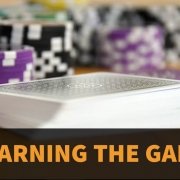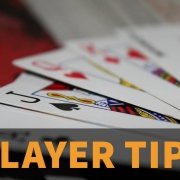To Bluff or Not to Bluff!
To Bluff or Not to Bluff, That is the Question!
Welcome back my friends! I hope that you’re enjoying the change in seasons and the additional sunlight that comes with it. The season isn’t the only thing changing around here…when you have a moment, check out our brand new website! All the information you need is there, including our latest promotions, great offers, and current JACKPOTS!
Something I overheard at the tables the other day really caught my attention and caused me to think a great deal about the topic. A regular opponent of mine said, “You just can’t bluff in this game, no one throws away their hand!” It struck me for two reasons. First, I have successfully bluffed this particular person on several occasions (in LIMIT poker no less!) Secondly, while his perception is a common one, it simply isn’t true. It certainly has some credence to it, as bluffing in limit poker is no easy task, and not one I would often recommend. That being said, there is a time and a place for it, both in limit and in no-limit Hold ’em. It’s impossible to pin down exactly when you should or shouldn’t bluff, but there are a couple things that you want to keep in mind if you’re considering making a move.
Know your opponent(s)
If you’re going to attempt the most daring play in poker (outside of playing Omaha!), be sure to have a decent understanding of who you are trying to bluff. We all know the few players that simply never fold a hand like top pair or better. It just doesn’t happen and they want to see your hand no matter how badly they’re beaten. You see them make hopeless calls on the river all the time against other players. Despite knowing this, you may find yourself in a pot with this person on the river when you completely missed your hand. You will feel the urge to bet. After all, it’s the only way you can win now, and the pot is so big…what’s one more bet? You MUST fight that urge. Take a second, remind yourself of whom you’re playing against, and simply let this one go. Save that bet and live to fight another day.
Now take that same situation and replace Captain Calls-a-Lot, with Pondering Patrick. Patrick is a thinker at the table. He tries to make the best play and often gives his decisions a lot of thought. He prides himself on his solid play and isn’t shy about telling people about it. He might even show a fold face up just to impress the table with his hand reading ability and his knowledge. Here is your opportunity. Now that’s not to say that you go out of your way to bluff Patrick, but if you happen to find yourself in a situation like the one above and Patrick is your only opponent, a bluff just might be in order if other conditions are right. What other conditions? Glad you asked…
Know your situation
Simply put, your bluff needs to make sense in order for it to have the best chance of working. If you haven’t been taking any aggressive action when other people have shown weakness, and now at the end of the hand you bluff trying to represent top pair, you’re going to have a tough time. Especially against more observant players, you want to make sure that your bet/bluff AND your previous actions in the hand are along the lines of what someone would expect you to do if you had the hand you are trying to represent. This advice is especially important in no-limit. When your actions are inconsistent and things don’t make sense to your opponent, they are far more likely to call your bet. This advice also applies when you are facing a potential bluff. Think back through the hand. Does your opponent’s play make sense? If something doesn’t quite add up, chances are a call is in order.
If you find yourself considering a bluff, be sure that you’ve thought about who your opponent(s) are and if your previous actions in the hand make sense. If both of those variable are favorable, then you may want to take a stab at it. If one or both of those factors are out of whack, you may be better served by waiting for a better spot. Don’t be afraid to go with your gut and put yourself (and your chips) out there! Until next time, see you at the tables!



